英语词汇学中的习语
词汇学英语习语分类

动词+副词+介词 Sit down under 忍受 Bid one’s time 等待时机 Fall by the way 中途退出 Burn the candle at both ends 过分地耗费精力 Make short work of 迅速处理 Go easy 从容不迫
名词性习语
形容词+名词 名词+介词+名词 High tea 正式茶点 A fly on the wheel 自高自大的人
副词性习语
名词+and+名词 介词+名词 介词+名词+and+名词
Heart and soul 全心全意地
In a breeze轻而易举地 Between the devil and the deep blue sea 进退维谷
谚语
The mills of God grind slowly. 天网恢恢疏而不漏 One cannot make a silk purse out of a sow’s ear.
巧妇难为无米之炊
Nothing venture, nothing have. 不入虎穴,焉得虎子 Enough is as good as a feast. 知足常乐
谜语
●What
goes on four legs in the morning, on two at noon, and on three in the evening.
英语习语的分类
英教二班 赵婉竹
英语习语的分类 英语习语的分类
一、动词性短语 二、名词性习语 三、形容词性习语 四、副词性习语 五、谚语 六、谜语Fra bibliotek动词性习语
词汇学英语习语分类

What changes a vegetable into a fruit? The letter R.
What cup can’t you drink from?
A hiccup.
What day do chickens hate the most?
Fry day.
What did the greedy lady get when she asked Santa for some diamonds? A pack of cards.
副词性习语
名词+and+名词 介词+名词 介词+名词+and+名词
Heart and soul 全心全意地
In a breeze轻而易举地 Between the devil and the deep blue sea 进退维谷
谚语
The mills of God grind slowly. 天网恢恢疏而不漏 One cannot make a silk purse out of a sow’sbed, a lion, a river in common. Spring. What do frozen cows do? They give ice-cream. What makes a road broad? The letter B Black I am and admired, Men seek me until they’re tired; When they find me, break my head, And take me from my resting bed. 皮肤黝黑招人爱, 总有人想把我采; 一旦有人找到我, 再不让我土里埋。
动词+副词+介词 Sit down under 忍受 Bid one’s time 等待时机 Fall by the way 中途退出 Burn the candle at both ends 过分地耗费精力 Make short work of 迅速处理 Go easy 从容不迫
英语习语(按单词分类)
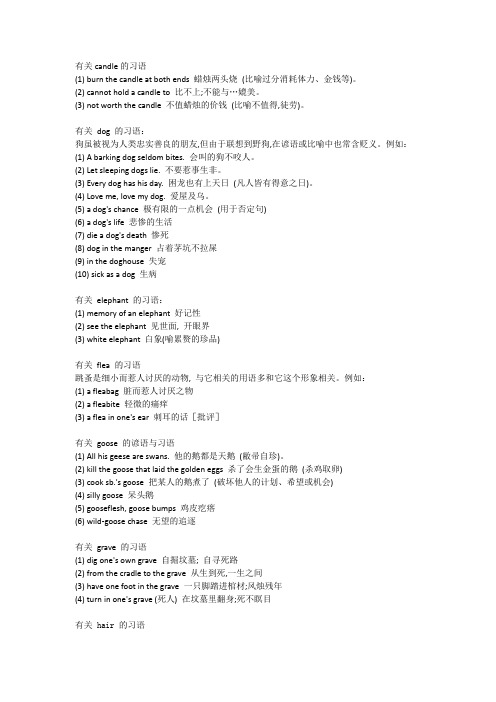
有关candle的习语(1) burn the candle at both ends 蜡烛两头烧(比喻过分消耗体力、金钱等)。
(2) cannot hold a candle to 比不上;不能与…媲美。
(3) not worth the candle 不值蜡烛的价钱(比喻不值得,徒劳)。
有关dog 的习语:狗虽被视为人类忠实善良的朋友,但由于联想到野狗,在谚语或比喻中也常含贬义。
例如:(1) A barking dog seldom bites. 会叫的狗不咬人。
(2) Let sleeping dogs lie. 不要惹事生非。
(3) Every dog has his day. 困龙也有上天日(凡人皆有得意之日)。
(4) Love me, love my dog. 爱屋及乌。
(5) a dog's chance 极有限的一点机会(用于否定句)(6) a dog's life 悲惨的生活(7) die a dog's death 惨死(8) dog in the manger 占着茅坑不拉屎(9) in the doghouse 失宠(10) sick as a dog 生病有关elephant 的习语:(1) memory of an elephant 好记性(2) see the elephant 见世面, 开眼界(3) white elephant 白象(喻累赘的珍品)有关flea 的习语跳蚤是细小而惹人讨厌的动物, 与它相关的用语多和它这个形象相关。
例如:(1) a fleabag 脏而惹人讨厌之物(2) a fleabite 轻微的痛痒(3) a flea in one's ear 刺耳的话[批评]有关goose 的谚语与习语(1) All his geese are swans. 他的鹅都是天鹅(敝帚自珍)。
(2) kill the goose that laid the golden eggs 杀了会生金蛋的鹅(杀鸡取卵)(3) cook sb.'s goose 把某人的鹅煮了(破坏他人的计划、希望或机会)(4) silly goose 呆头鹅(5) gooseflesh, goose bumps 鸡皮疙瘩(6) wild-goose chase 无望的追逐有关grave 的习语(1) dig one's own grave 自掘坟墓; 自寻死路(2) from the cradle to the grave 从生到死,一生之间(3) have one foot in the grave 一只脚踏进棺材;风烛残年(4) turn in one's grave (死人) 在坟墓里翻身;死不瞑目有关 hair 的习语(1) get in sb.'s hair 触怒某人;使某人烦恼(2) keep one's hair on 努力保持镇静(3) let one's hair down 不拘礼节;举止随便(4) lose one's hair 发怒(5) make sb.'s hair stand on end 使某人毛骨悚然(6) not harm a hair on sb.'s head 不伤某人毫发;温柔相待(7) not turn a hair 神情自若(8) split hairs 作极细微的分析;吹毛求疵(9) tear one's hair out (因悲伤、愤怒而) 扯头发;动作狂野有关 hare 的谚语与习语(1) If you run after two hares, you will catch neither. 逐二兔,两头空。
英语习语讲解

如:a. The products of Japan are gradually edging those of the United States out of the European market. 逐渐排除去
b. I think that man is just hanging out for a better offer. 故意拖延以待
dark horse.
II. 英语习语的分类
从语法功能和结构成份来看,习语可分为:
一、动词性习语 动词性习语(idioms verbal in nature)以动词为中心与其 他动词搭配使用,在句中起谓语作用。 动词性习语有以下几种结构: 1. 动词 + 小品词(verb + particle)
(1) 动词 + 副词 如:Some parts of the story didn’t add up. 合乎情理
2. 介词 + 形容词 如: on the go,
on call, out of sorts,
3. 形容(或副词)+ 介词短语 如:wide of mark, wet behind the ears,
4. as + 形容词 + as + 名词
如:as stiff as a poker, as cool as a cucumber
狭义上:一种语言中长期以来习用的、表达 完整意义的、结构定型的固定词组 或短句。“习语、熟语、惯用法”
I. 英语习语的特征
英语习语有两个特征:
a. 语义的统一性(semantic unity)
习语是个固定的词组,在语义上是个不可分 割的统一体,其整体的意义往往不能从组成 习语的各个词汇意义中揣测出来。
英语习语

英语习语大全
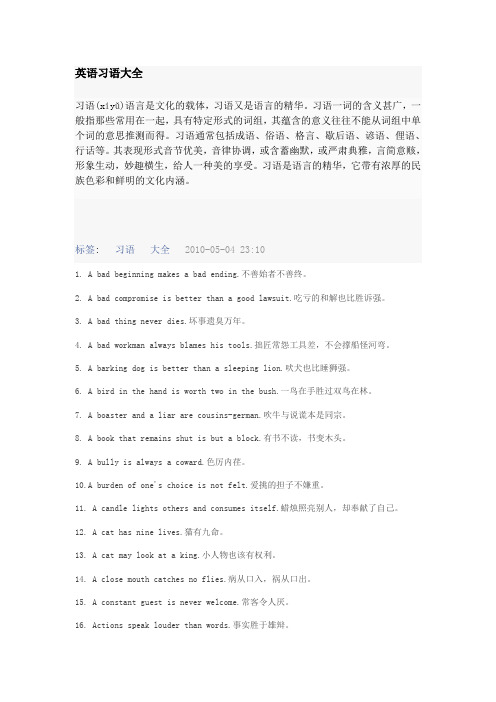
英语习语大全习语(xíyǔ)语言是文化的载体,习语又是语言的精华。
习语一词的含义甚广,一般指那些常用在一起,具有特定形式的词组,其蕴含的意义往往不能从词组中单个词的意思推测而得。
习语通常包括成语、俗语、格言、歇后语、谚语、俚语、行话等。
其表现形式音节优美,音律协调,或含蓄幽默,或严肃典雅,言简意赅,形象生动,妙趣横生,给人一种美的享受。
习语是语言的精华,它带有浓厚的民族色彩和鲜明的文化内涵。
标签: 习语大全2010-05-04 23:101. A bad beginning makes a bad ending.不善始者不善终。
2. A bad compromise is better than a good lawsuit.吃亏的和解也比胜诉强。
3. A bad thing never dies.坏事遗臭万年。
4. A bad workman always blames his tools.拙匠常怨工具差,不会撑船怪河弯。
5. A barking dog is better than a sleeping lion.吠犬也比睡狮强。
6. A bird in the hand is worth two in the bush.一鸟在手胜过双鸟在林。
7. A boaster and a liar are cousins-german.吹牛与说谎本是同宗。
8. A book that remains shut is but a block.有书不读,书变木头。
9. A bully is always a coward.色厉内荏。
10.A burden of one's choice is not felt.爱挑的担子不嫌重。
11. A candle lights others and consumes itself.蜡烛照亮别人,却奉献了自己。
12. A cat has nine lives.猫有九命。
浅谈英语中的习语

词汇学期末论文吴亚丹外语系一班30号浅谈英语中的习语摘要:英语习语是英语词汇的重要组成部分,是人们经过长时间的使用提炼出来的含有特殊意义的固定词语组合,在人们的日常生活中广泛应用。
本文主要从英语习语的来源,习语的特点,习语的分类以及习语的变异来浅谈一下英语中的习语。
关键词:习语,来源,特点,分类,变异《牛津当代英语习语词典》导言中说:“熟悉大量的习惯用语,并能恰到好处地用于上下文,这是能象操本族语那样掌握英语的一个显著标志。
”在英语中,习语的运用如此普遍,说话、写文章不用习语是很困难的。
因此,习语学习是词汇学习必不可少的一部分。
英语习语是在英语的发展过程中经过长期的社会实践提炼出来的独特的、固定的短语和短句, 是语言的精华。
广义的英语习语包括成语、谚语、歇后语、典故、俗语等,是语言发展的结晶。
英语习语是富于色彩的语言形式,具有生动形象、喻义明显、富于哲理的语言特征。
在一定程度下反映了英语民族的文化特点。
一.英语习语的来源(1)源于历史故事或历史事件如:“Burn one’s boats ”,此习语中的“bridges”被美国人使用,原意是指古罗马朱力斯·凯撒大军船越过Rubicon后就把船烧了,以此来告诉士兵后路已断,只有前进,与汉语中的破釜沉舟意义很相近。
(2)源于《圣经》或神话故事英美等国家人民主要信奉基督教,作为他们信奉的宗教经典,《圣经》在其宗教生活中扮演着非常重要的角色。
因受到英美国家人民的喜爱而广为流传,成为大量英语习语的来源。
如:“Achilles' heel” (惟一致命的弱点), “a Pandora’s box” (潘多拉之盒,即灾难、麻烦、祸害的根源), “As wise as Solomon” (像所罗门一样聪明, 比喻非常富有智慧等)。
还有一些习语源于神话故事或传说,如:“kill the goose to get the eggs”源于希腊寓言, 说的是有一个乡下人, 因为发财心切杀了自己饲养的那只能下金蛋的鹅, 以为如此就可一次获得全部想像中的金块, 但其结果一无所获。
英语习语

英语习语Class:0802Name:Ma XiaoNumber:30关键字:英语习语的特征;分类;应用摘要:习语语言是文化的载体,习语一词的含义甚广,一般指那些常用在一起,具有特定形式的词组,其蕴含的意义往往不能从词组中单个词的意思推测而得,习语是语言的精华,它带有浓厚的民族特色和鲜明的文化内涵。
本文将一一介绍习语的分类和语言特色。
一,英语习语的分类从语法功能和结构成分来看,习语可分成以下几种:1.动词性习语动词性习语以动词为中心与其他词语搭配使用,在句中起谓语作用,这一类习语在英语中占相当大的比列。
动词性习语由以下几种结构构成:(1)短语动词不及物动词+介词look into=investigate不及物动词+副词go on=continue及物动词+介词/副词put off=discourage…from;cause…to dislike;delay;make excuses in order to avoid a duty及物动词+副词turn on=switch on;excite or interest strongly不及物动词+介词+副词get away with=do something wrong without being punished及物动词+介词+副词put down to=state that something is caused explained by(2)其他动词短语动词+代词make it=arrived in time,succeed动词+所有格+名词follow one’s nose=go straight ahead , go in the same direction动词+名词follow the sea=become a sailor动词+形容词fall flat=fail completely in its intended or expected effect动词+代词+名词call it a day=decide or agree to either temporarily or for good ; give somebody the bag=fire or dismiss somebody动词+形容词+名词sing a different tune=change one’s opinion or attitude动词+and+动词chop and change=fluctuate or vary conetantly;keep change one’s opinion动词+介词短语swim against the stream =do the opposite of what most people want to do;go against the way things are happening动词+副词+介词短语come back to earth=stop imagining or dreaming 动词+名词+动词make ends meet=earn what it costs to live动词+名词+动词进行时keep the pot boiling= earn enough to maintain an adequate stangard of living;keep a situation active ,amusing动词+名词+ let the dog see the rabbit=do not get in the way of another who wishes to see or do something动词+名词+ bite the hand that feeds one=repay kindness with wrong;turn against or hurt a helper or supporter2.名词性习语(1)形容词+名词high tea(正式茶点),cold shoulder (冷淡),red herring(转移注意力的话或事物),white elephant(无用而累赘的东西),fond dream(黄粱美梦),blue chip(热门的股票),the happy medium(中庸之道)(2).名词+介词+名词a fly in the ointment(美中不足之处;使人扫兴的小事),a fly on the wheel(自高自大的人),an apple of discorder(争端;祸根),a bed of thorns(不愉快的境遇),drug in the market(市场上的直销产品),a friend at court(有势力的朋友),the milk of human kindness(天生的善心;人情味),a snake in the grass(潜伏的危险;潜伏的敌人)(3).名词或专有名词+’s+名词the lion’ share(最大或最好的份额),Achilles’ heel(唯一致命的弱点),cat’s paw(被人利用的人),King’s weather(庆典时的晴朗天气),a mare’s nest(骗人的东西;混乱),man’s estate(壮年)(4)名词+and+名词Wear and tear(损耗;磨损),rank and file(普通士兵们;普通成员们),flesh and blood(亲骨肉,属),ways and means(方法,办法),part and parcel(重要或必要的部分),the ins and the outs(种种复杂详情),ups and downs(盛衰;沉浮),the pros and cons(赞成者和反对者;正面和反面的理由)(5)名词+名词Sheet anchor(最后的或主要的靠山),brain trust(智囊团),a moot point(尚未定论的问题),brain drain(智囊枯竭)3.形容词性习语(1).形容词+and+形容词high and mighty(趾高气扬;神气活现),null and void(无效),free and easy(不拘形式的;随便的),fair and square(正大光明的),cut and dried(呆板的,没有生气的)(2).词+名词On the go(忙个不停;活跃着),on call(随叫随到),outOf sorts(不舒服的;不高兴的),beyong the pale(失宠;丢脸),behind the eightball(处于不利地位),on edge(紧张不安;易怒)(3).形容词或副词+介词短语Wide of the mark(远未射中目标;毫不相关),wet behind the ears(缺乏经验的),up to the hammer(第一流的,极好的),up in the air(十分激动;气愤;悬而未决)(4)。
idioms英语名词词汇学解释
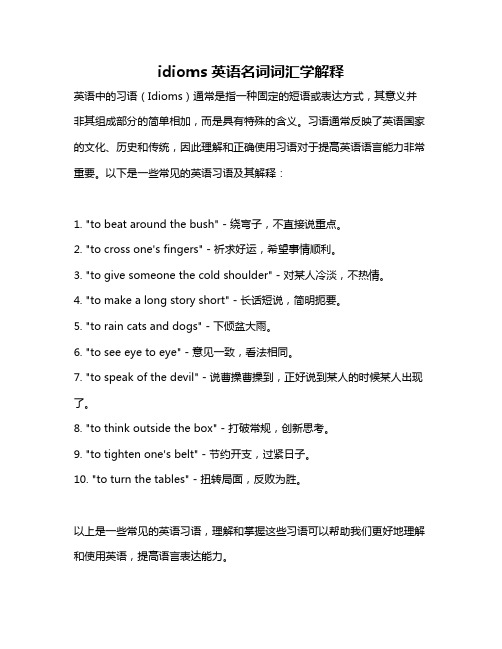
idioms英语名词词汇学解释
英语中的习语(Idioms)通常是指一种固定的短语或表达方式,其意义并非其组成部分的简单相加,而是具有特殊的含义。
习语通常反映了英语国家的文化、历史和传统,因此理解和正确使用习语对于提高英语语言能力非常重要。
以下是一些常见的英语习语及其解释:
1. "to beat around the bush" - 绕弯子,不直接说重点。
2. "to cross one's fingers" - 祈求好运,希望事情顺利。
3. "to give someone the cold shoulder" - 对某人冷淡,不热情。
4. "to make a long story short" - 长话短说,简明扼要。
5. "to rain cats and dogs" - 下倾盆大雨。
6. "to see eye to eye" - 意见一致,看法相同。
7. "to speak of the devil" - 说曹操曹操到,正好说到某人的时候某人出现了。
8. "to think outside the box" - 打破常规,创新思考。
9. "to tighten one's belt" - 节约开支,过紧日子。
10. "to turn the tables" - 扭转局面,反败为胜。
以上是一些常见的英语习语,理解和掌握这些习语可以帮助我们更好地理解和使用英语,提高语言表达能力。
英语习语

常见的习语(Example)
● 与“hair”相关的短语
1. make someone's hair stand on end=make someone's hair curl 使某人毛骨悚然 2. let your hair down 彻底放松 let hair down ,表面意思是把头发散下来 3. keep one's hair on 冷静/保持淡定
容易误解的英语习语
1. rain cats and dogs下倾盆大雨 字面来看是下猫猫狗狗 2. eleventh hour 最后时刻 eleventh hour并不是表示十一点
容易误解的英语习语
3. dead president 美钞
4. horse sense常识 这个词源于十九世纪美国西部。 5. blind date 男女间的初次会面,相亲 很容易被翻译成瞎约会或者盲目的约会
英语习语文化
The Culture of English Idiom
Daisy Lu
Contents
目录 1 2
英语词汇学中的习语
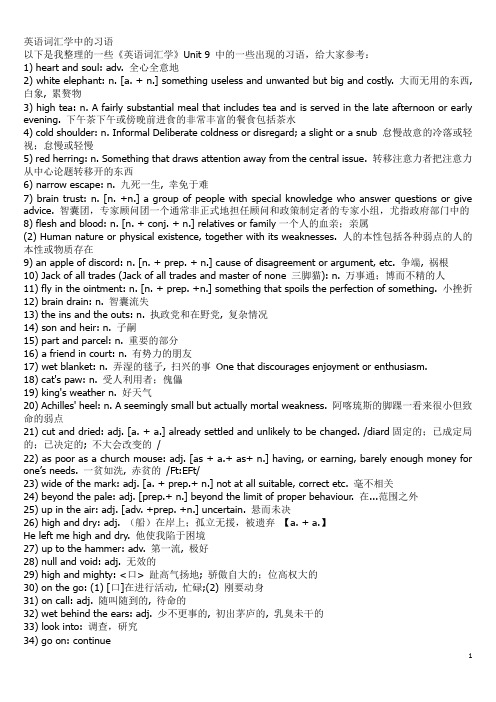
英语词汇学中的习语以下是我整理的一些《英语词汇学》Unit 9 中的一些出现的习语,给大家参考:1) heart and soul: adv. 全心全意地2) white elephant: n. [a. + n.] something useless and unwanted but big and costly. 大而无用的东西, 白象, 累赘物3) high tea: n. A fairly substantial meal that includes tea and is served in the late afternoon or early evening. 下午茶下午或傍晚前进食的非常丰富的餐食包括茶水4) cold shoulder: n. Informal Deliberate coldness or disregard; a slight or a snub 怠慢故意的冷落或轻视;怠慢或轻慢5) red herring: n. Something that draws attention away from the central issue. 转移注意力者把注意力从中心论题转移开的东西6) narrow escape: n. 九死一生, 幸免于难7) brain trust: n. [n. +n.] a group of people with special knowledge who answer questions or give advice. 智囊团,专家顾问团一个通常非正式地担任顾问和政策制定者的专家小组,尤指政府部门中的8) flesh and blood: n. [n. + conj. + n.] relatives or family一个人的血亲;亲属(2) Human nature or physical existence, together with its weaknesses. 人的本性包括各种弱点的人的本性或物质存在9) an apple of discord: n. [n. + prep. + n.] cause of disagreement or argument, etc. 争端, 祸根10) Jack of all trades (Jack of all trades and master of none 三脚猫): n. 万事通;博而不精的人11) fly in the ointment: n. [n. + prep. +n.] something that spoils the perfection of something. 小挫折12) brain drain: n. 智囊流失13) the ins and the outs: n. 执政党和在野党, 复杂情况14) son and heir: n. 子嗣15) part and parcel: n. 重要的部分16) a friend in court: n. 有势力的朋友17) wet blanket: n. 弄湿的毯子, 扫兴的事One that discourages enjoyment or enthusiasm.18) cat's paw: n. 受人利用者;傀儡19) king's weather n. 好天气20) Achilles' heel: n. A seemingly small but actually mortal weakness. 阿喀琉斯的脚踝一看来很小但致命的弱点21) cut and dried: adj. [a. + a.] already settled and unlikely to be changed. /diard固定的;已成定局的;已决定的; 不大会改变的/22) as poor as a church mouse: adj. [as + a.+ as+ n.] having, or earning, barely enough money for one’s needs. 一贫如洗, 赤贫的/Ft:EFt/23) wide of the mark: adj. [a. + prep.+ n.] not at all suitable, correct etc. 毫不相关24) beyond the pale: adj. [prep.+ n.] beyond the limit of proper behaviour. 在...范围之外25) up in the air: adj. [adv. +prep. +n.] uncertain. 悬而未决26) high and dry: adj. (船)在岸上;孤立无援,被遗弃【a. + a.】He left me high and dry. 他使我陷于困境27) up to the hammer: adv. 第一流, 极好28) null and void: adj. 无效的29) high and mighty: <口> 趾高气扬地; 骄傲自大的;位高权大的30) on the go: (1) [口]在进行活动, 忙碌;(2) 刚要动身31) on call: adj. 随叫随到的, 待命的32) wet behind the ears: adj. 少不更事的, 初出茅庐的, 乳臭未干的33) look into: 调查,研究34) go on: continue35) put off: 推迟, 拖延, 搪塞, 使分心, 使厌恶, 扔掉, 脱掉, 劝阻36) turn on:37) get away with: do something wrong without being punished. (phrasal verbs) 侥幸成功, 逃避惩罚[责备, 追究]38) put down to: state that something is caused or explained by. (phrasal verbs) 把……归结于39) follow one’s nose: [v. + poss. + n. ] go straight ahead, go in the same direction. 笔直走, 凭本能做事(verb phrases)40) make it: [v.+ pron.] arrive in time; succeed. 及时赶到,成功(verb phrases)41) fall flat: [v. + a.] fail completely in its intended or expected effect. 达不到预期效果, 完全失败(verb phrases)42) give sb. the bag: [v. + pron. + n. ] fire or dismiss somebody. (verb phrases)43) sing a different tune: [v. + a. + n.] change one’s opinion or attitude (verb phrases)44) call it a day: [v. + pron. + n.] decide or agree to stop either temporarily or for good. 暂时停止;结束一天的工作(verb phrases)45) chop and change: [v. + conj. + v.] fluctuate or va ry constantly; keep changing one’s opinion, etc. 持续浮动或变动;不断变换注意和观点,等等(verb phrases)46) swim against the stream: [v. + prep. phrase] do the opposite of what most people want to do; go against the way things are happening. 反潮流;逆潮流行事(verb phrases)47) come back to earth: [v. + adv. + prep. phrase] stop imagining or dreaming. (verb phrases)48) make ends meet: [v+n+v] earn what it costs to live. 收支相抵(verb phrases)49) keep the pot boiling: [v+n+v-ing] earn enough to maintain an adequate standard of living; keep a situation active, amusing, etc. 谋生, 维持生活, 使保持活泼(verb phrases)。
词汇学考试的相关习语翻译

Touch pitch, and you will be defiled.常在河边走,哪有不湿鞋。
Troubles never come singly.福无双至,祸不单行。
Truth never grows old.真理永存。
Turn over a new leaf.洗心革面,改过自新。
Two dogs strive for a bone, and a third runs away with it.鹬蚌相争,渔翁得利。
Unpleasant advice is a good medicine.忠言逆耳利于行。
What's done cannot be undone.生米煮成熟饭了。
Where there is life, there is hope.留得青山在,不怕没柴烧。
Work makes the workman.勤工出巧匠。
Y ou can take a horse to the water but you cannot make him drink. 强扭的瓜不甜。
Y ou may know by a handful the whole sack.由一斑可知全貌。
Birds of a feather flock together.物以类聚人以群分Fish in the trouble waters.浑水摸鱼Add fuel to the fire. 火上浇油Walls have ears.隔墙有耳Strike while the iron is hot. 趁热打铁A drop in the ocean 沧海一粟Still water runs deep. 静水流深Blood is thicker than water 血浓于水A rolling stone gathers no moss 滚石不生苔A bird in the hand is worth two in the bush二鸟在林不如一鸟在手Once bitten, twice shy一朝被蛇咬十年怕井绳Run with hare and hunt with hounds 两边讨好A new broom sweeps clean 新官上任三把火A stitch in time saves nine 防微杜渐,免遭大祸。
英语习语的理解与翻译
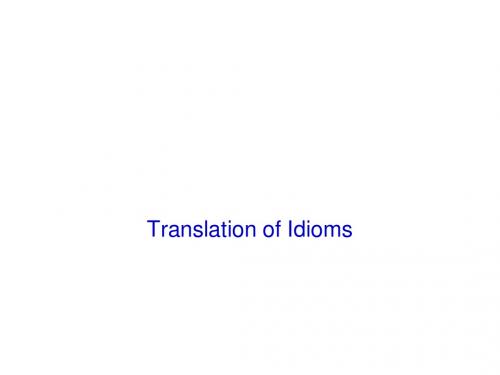
• • • • • • • •
Translation: 坏蛋 易如反掌 精神饱满(在美国俚语里full of beans另有“错误 连篇”的意思 ) 井井有条;整整齐齐 恭维;拍马屁 在家凶如狮,在外却如鼠。 猫儿不在,老鼠作怪。(山中无老虎,猴子称大 王。 )
• • • • • • • •
翻译练习 be a bad egg be a piece of cake be full of beans be in apple-pie order to butter someone up A lion at home, a mouse abroad When the cat’s away, the mice will play.
Translation of Idioms
• 在语言的发展过程中,人们经过长期的社会实践 提炼出一些固定的短语或短句,这就是习语,也 是语言的精华,是人们智慧的结晶。 • 英语习语从广义上讲,包括俗语 (colloquialism)、谚语(proverb)、俚语 (slang expression)等。
• 一、直译法
• • • • • 采用直译的习语多半是英语和汉语在比喻和形 象方面基本相同的 to add fuel to the flames 火上加油 to be on thin ice 如履薄冰 walls have ears 隔墙有耳 a stony heart 铁石心肠
高中常用英语习语大全

高中常用英语习语大全(总4页)-CAL-FENGHAI.-(YICAI)-Company One1-CAL-本页仅作为文档封面,使用请直接删除英语习语大全习语(xíyǔ)语言是文化的载体,习语又是语言的精华。
习语一词的含义甚广,一般指那些常用在一起,具有特定形式的词组,其蕴含的意义往往不能从词组中单个词的意思推测而得。
习语通常包括成语、俗语、格言、歇后语、谚语、俚语、行话等。
其表现形式音节优美,音律协调,或含蓄幽默,或严肃典雅,言简意赅,形象生动,妙趣横生,给人一种美的享受。
习语是语言的精华,它带有浓厚的民族色彩和鲜明的文化内涵。
本文由【语文公社】友情提供1. A bad beginning makes a bad ending.不善始者不善终。
2. A bad compromise is better than a good lawsuit.吃亏的和解也比胜诉强。
3. A bad thing never dies.坏事遗臭万年。
4. A bad workman always blames his tools.拙匠常怨工具差,不会撑船怪河弯。
5. A barking dog is better than a sleeping lion.吠犬也比睡狮强。
6. A bird in the hand is worth two in the bush.一鸟在手胜过双鸟在林。
7. A boaster and a liar are cousins-german.吹牛与说谎本是同宗。
8. A book that remains shut is but a block.有书不读,书变木头。
9. A bully is always a coward.色厉内荏。
burden of one's choice is not felt.爱挑的担子不嫌重。
11. A candle lights others and consumes itself.蜡烛照亮别人,却奉献了自己。
11英语词汇学教案 第8章 英语习语

理论教学教案(总第 19- 20学时)项目名称第8章英语习语授课学时2任务名称理解英语习语特征,分类及应用教学目标一、英语习语的特征二、英语习语的分类三、英语习语整体与结构之间的关系四、英语习语的修辞色彩与语体色彩五、英语习语的应用教学重点英语习语的特征教学难点英语习语的应用教学资源PPT教学过程设计教学内容时间分配教学活动设计Step1: 引入复习上一次学习内容Step2: 新课讲授I. 英语习语的特征 English idioms1. 语义的统一性 Semantic Unity2. 结构的固定性 Structural StabilityII. 英语习语的分类1.动词性习语1)动词+小品词They tried to find ways of getting round the tax laws. 2)动词+名词bide one’s time 等待时机 blaze the trail 开辟道路2.名词性习语a fly in the ointment美中不足之处(N + Prep + N)a fly on the wheel自高自大的人3. 形容词性习语4. 副词性习语5. 谚语III. 英语习语的整体与结构成分之间的语义关系习语的意义和构成这个习语的词的意义已经丧失联系:无理据习语wear one’s heart on one’s sleeve (过于直率)much cry and little wool(空忙、雷声大雨点小)2. 习语的意义和构成这个习语的词的意义有一定联系常带有隐喻和明喻色彩to stab in the back 在背后用匕首此人——暗箭伤人a dog in the manger 占着马槽的狗——占着茅坑不拉屎的人to kill two birds with one stone一石二鸟、一箭双雕IV. 英语习语的修辞色彩和语体色彩1.属于语言共核部分的习语2.带有口语色彩的习语3.带有俚语色彩的习语V. 英语习语的应用1.句法功能2. 英语习语与其他词搭配bed of roses: job, position, life, experience, place…3. 习语的灵活运用1)习语的组成部分的分拆 Pull a long face3. 习语组成部分的缩略Velvet paw口蜜腹剑 velvet paws hide sharp claws A straw (straws) in the wind 苗头 a straw shows which way the wind blows 草动知风向作业布置复习所学内容授课日期及授课地点明德楼205 第周下午67节课后反思英语习语的具体案例还需多花时间掌握。
英语习语的定义与特征

think on one’s feet 思想敏捷
习语的语义特征
4.不能通过类比或推理创造新的习语义。 be under the weather (感到不舒服) be above the weather man Friday →girl Friday
假装
Match work
心情不好 join forces join the forces 有兴趣,想做 in a mood 秘密地,私下地 in the mood 参军 behind closed doors 让某人感到高兴 put the finger on someone 联合起来 behind the scenes 在幕后 give someone a kick 告发某人
习语的语义特征
2.许多习语在意义上具有两面性,即,具 有字面意义又有习语意义,而它们的字面 意义与习语意义可说是风马牛不相及,如 果没有上下文作参照,是很难确定一个表 达式是字面义还是习语义。 a rainy day miss the boat 雨天 / 艰难时刻 失去机会 / 误船
习语的语义特征
习语的定义ຫໍສະໝຸດ idiotisme→ idiotism →idiom
A group of words whose meaning is different from the meanings of the individual words.
习语是结构相对固定的词组或短句,它 的意义不是其构成词各意义的简单相加。
习语的结构特征
8.习语里的形容词相当固定。 pull a long face 不能说pull a longer face
英语习语(按单词分类)

有关candle的习语(1) burn the candle at both ends 蜡烛两头烧 (比喻过分消耗体力、金钱等)。
(2) cannot hold a candle to 比不上;不能与…媲美。
(3) not worth the candle 不值蜡烛的价钱 (比喻不值得,徒劳)。
有关 dog 的习语:狗虽被视为人类忠实善良的朋友,但由于联想到野狗,在谚语或比喻中也常含贬义。
例如:(1) A barking dog seldom bites. 会叫的狗不咬人。
(2) Let sleeping dogs lie. 不要惹事生非。
(3) Every dog has his day. 困龙也有上天日 (凡人皆有得意之日)。
(4) Love me, love my dog. 爱屋及乌。
(5) a dog's chance 极有限的一点机会 (用于否定句)(6) a dog's life 悲惨的生活(7) die a dog's death 惨死(8) dog in the manger 占着茅坑不拉屎(9) in the doghouse 失宠(10) sick as a dog 生病有关 elephant 的习语:(1) memory of an elephant 好记性(2) see the elephant 见世面, 开眼界(3) white elephant 白象(喻累赘的珍品)有关 flea 的习语跳蚤是细小而惹人讨厌的动物, 与它相关的用语多和它这个形象相关。
例如:(1) a fleabag 脏而惹人讨厌之物(2) a fleabite 轻微的痛痒(3) a flea in one's ear 刺耳的话[批评]有关 goose 的谚语与习语(1) All his geese are swans. 他的鹅都是天鹅 (敝帚自珍)。
(2) kill the goose that laid the golden eggs 杀了会生金蛋的鹅 (杀鸡取卵)(3) cook sb.'s goose 把某人的鹅煮了 (破坏他人的计划、希望或机会)(4) silly goose 呆头鹅(5) gooseflesh, goose bumps 鸡皮疙瘩(6) wild-goose chase 无望的追逐有关 grave 的习语(1) dig one's own grave 自掘坟墓; 自寻死路(2) from the cradle to the grave 从生到死,一生之间(3) have one foot in the grave 一只脚踏进棺材;风烛残年(4) turn in one's grave (死人) 在坟墓里翻身;死不瞑目有关 hair 的习语(1) get in sb.'s hair 触怒某人;使某人烦恼(2) keep one's hair on 努力保持镇静(3) let one's hair down 不拘礼节;举止随便(4) lose one's hair 发怒(5) make sb.'s hair stand on end 使某人毛骨悚然(6) not harm a hair on sb.'s head 不伤某人毫发;温柔相待(7) not turn a hair 神情自若(8) split hairs 作极细微的分析;吹毛求疵(9) tear one's hair out (因悲伤、愤怒而) 扯头发;动作狂野有关 hare 的谚语与习语(1) If you run after two hares, you will catch neither. 逐二兔,两头空。
- 1、下载文档前请自行甄别文档内容的完整性,平台不提供额外的编辑、内容补充、找答案等附加服务。
- 2、"仅部分预览"的文档,不可在线预览部分如存在完整性等问题,可反馈申请退款(可完整预览的文档不适用该条件!)。
- 3、如文档侵犯您的权益,请联系客服反馈,我们会尽快为您处理(人工客服工作时间:9:00-18:30)。
英语词汇学中的习语
以下是我整理的一些《英语词汇学》Unit 9 中的一些出现的习语,给大家参考:
1) heart and soul: adv. 全心全意地
2) white elephant: n. [a. + n.] something useless and unwanted but big and costly. 大而无用的东西, 白象, 累赘物
3) high tea: n. A fairly substantial meal that includes tea and is served in the late afternoon or early evening. 下午茶下午或傍晚前进食的非常丰富的餐食包括茶水
4) cold shoulder: n. Informal Deliberate coldness or disregard; a slight or a snub 怠慢故意的冷落或轻视;怠慢或轻慢
5) red herring: n. Something that draws attention away from the central issue. 转移注意力者把注意力从中心论题转移开的东西
6) narrow escape: n. 九死一生, 幸免于难
7) brain trust: n. [n. +n.] a group of people with special knowledge who answer questions or give advice. 智囊团,专家顾问团一个通常非正式地担任顾问和政策制定者的专家小组,尤指政府部门中的8) flesh and blood: n. [n. + conj. + n.] relatives or family一个人的血亲;亲属
(2) Human nature or physical existence, together with its weaknesses. 人的本性包括各种弱点的人的本性或物质存在
9) an apple of discord: n. [n. + prep. + n.] cause of disagreement or argument, etc. 争端, 祸根
10) Jack of all trades (Jack of all trades and master of none 三脚猫): n. 万事通;博而不精的人
11) fly in the ointment: n. [n. + prep. +n.] something that spoils the perfection of something. 小挫折
12) brain drain: n. 智囊流失
13) the ins and the outs: n. 执政党和在野党, 复杂情况
14) son and heir: n. 子嗣
15) part and parcel: n. 重要的部分
16) a friend in court: n. 有势力的朋友
17) wet blanket: n. 弄湿的毯子, 扫兴的事One that discourages enjoyment or enthusiasm.
18) cat's paw: n. 受人利用者;傀儡
19) king's weather n. 好天气
20) Achilles' heel: n. A seemingly small but actually mortal weakness. 阿喀琉斯的脚踝一看来很小但致命的弱点
21) cut and dried: adj. [a. + a.] already settled and unlikely to be changed. /diard固定的;已成定局的;已决定的; 不大会改变的/
22) as poor as a church mouse: adj. [as + a.+ as+ n.] having, or earning, barely enough money for one’s needs. 一贫如洗, 赤贫的/Ft:EFt/
23) wide of the mark: adj. [a. + prep.+ n.] not at all suitable, correct etc. 毫不相关
24) beyond the pale: adj. [prep.+ n.] beyond the limit of proper behaviour. 在...范围之外
25) up in the air: adj. [adv. +prep. +n.] uncertain. 悬而未决
26) high and dry: adj. (船)在岸上;孤立无援,被遗弃【a. + a.】
He left me high and dry. 他使我陷于困境
27) up to the hammer: adv. 第一流, 极好
28) null and void: adj. 无效的
29) high and mighty: <口> 趾高气扬地; 骄傲自大的;位高权大的
30) on the go: (1) [口]在进行活动, 忙碌;(2) 刚要动身
31) on call: adj. 随叫随到的, 待命的
32) wet behind the ears: adj. 少不更事的, 初出茅庐的, 乳臭未干的
33) look into: 调查,研究
34) go on: continue
35) put off: 推迟, 拖延, 搪塞, 使分心, 使厌恶, 扔掉, 脱掉, 劝阻
36) turn on:
37) get away with: do something wrong without being punished. (phrasal verbs) 侥幸成功, 逃避惩罚[责备, 追究]
38) put down to: state that something is caused or explained by. (phrasal verbs) 把……归结于
39) follow one’s nose: [v. + poss. + n. ] go straight ahead, go in the same direction. 笔直走, 凭本能做事(verb phrases)
40) make it: [v.+ pron.] arrive in time; succeed. 及时赶到,成功(verb phrases)
41) fall flat: [v. + a.] fail completely in its intended or expected effect. 达不到预期效果, 完全失败(verb phrases)
42) give sb. the bag: [v. + pron. + n. ] fire or dismiss somebody. (verb phrases)
43) sing a different tune: [v. + a. + n.] change one’s opinion or attitude (verb phrases)
44) call it a day: [v. + pron. + n.] decide or agree to stop either temporarily or for good. 暂时停止;结束一天的工作(verb phrases)
45) chop and change: [v. + conj. + v.] fluctuate or va ry constantly; keep changing one’s opinion, etc. 持续浮动或变动;不断变换注意和观点,等等(verb phrases)
46) swim against the stream: [v. + prep. phrase] do the opposite of what most people want to do; go against the way things are happening. 反潮流;逆潮流行事(verb phrases)
47) come back to earth: [v. + adv. + prep. phrase] stop imagining or dreaming. (verb phrases)
48) make ends meet: [v+n+v] earn what it costs to live. 收支相抵(verb phrases)
49) keep the pot boiling: [v+n+v-ing] earn enough to maintain an adequate standard of living; keep a situation active, amusing, etc. 谋生, 维持生活, 使保持活泼(verb phrases)。
